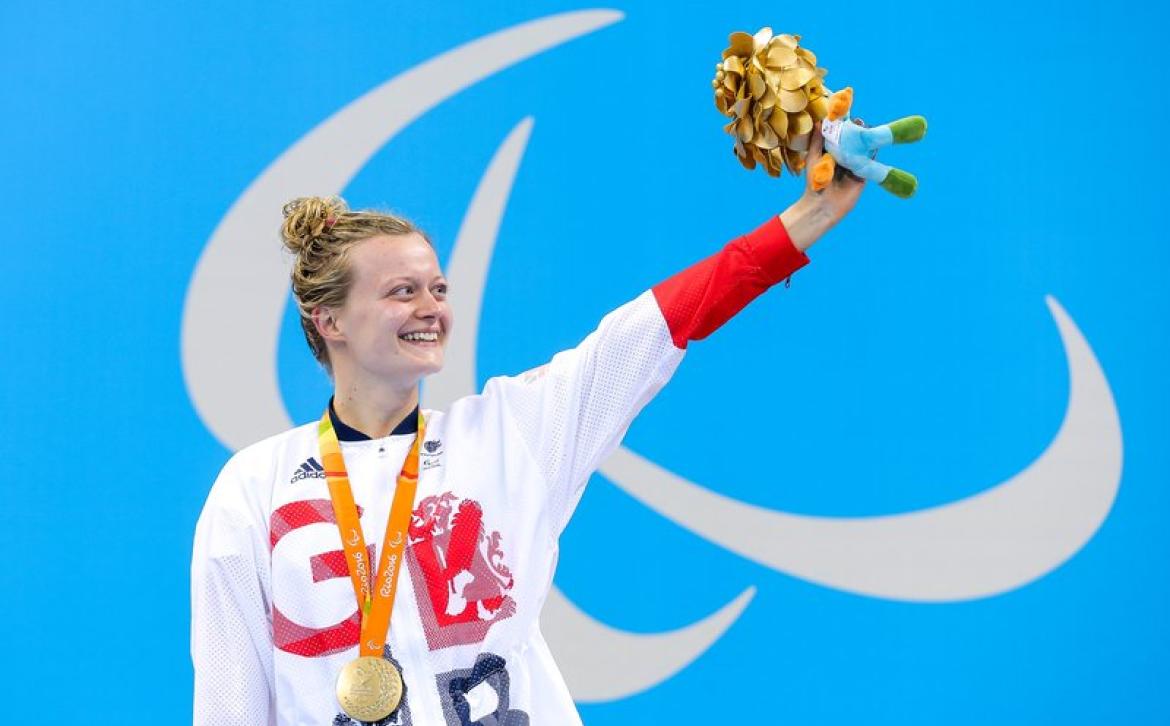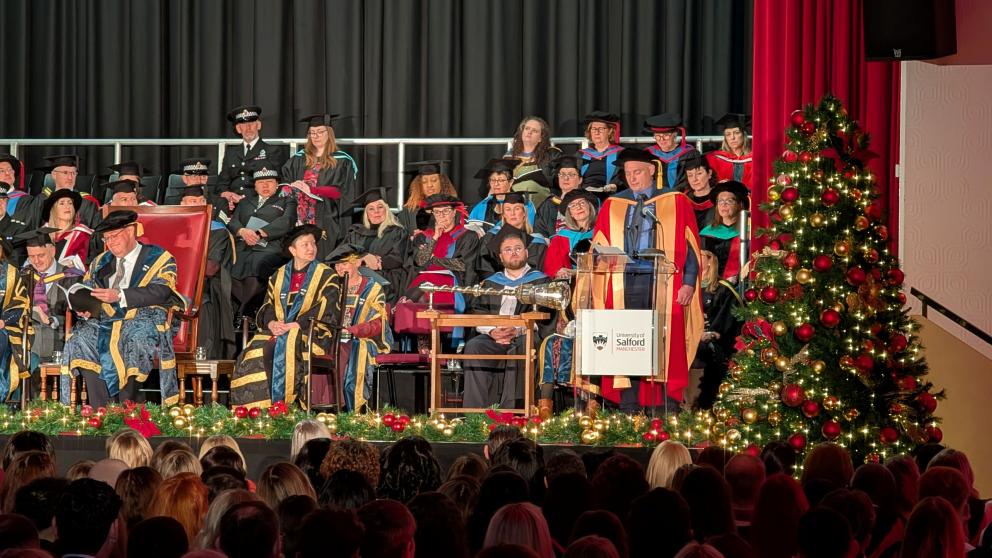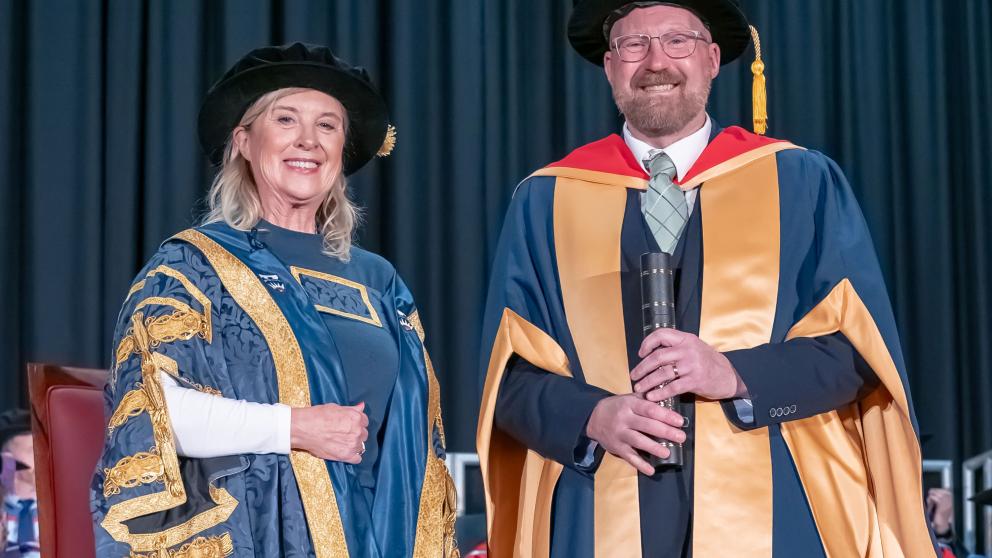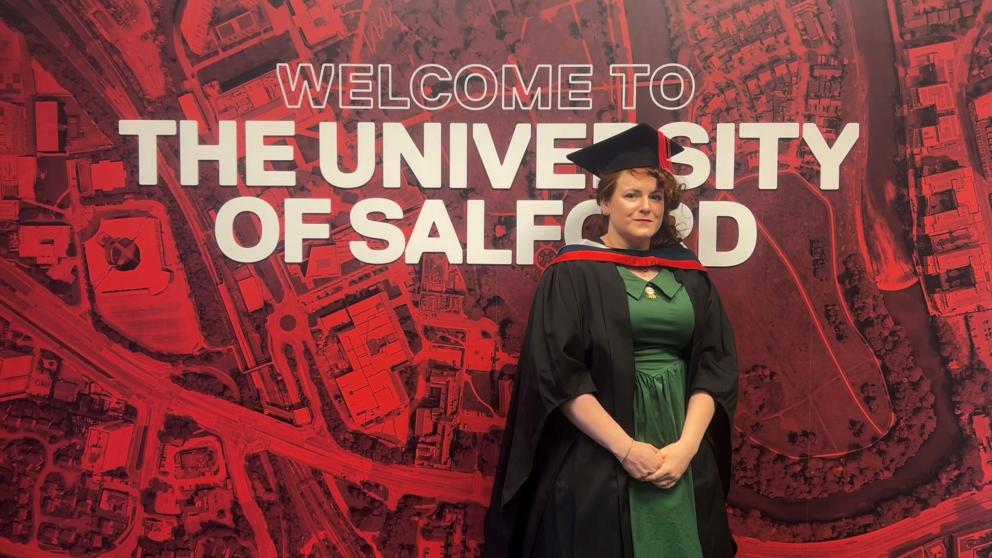Salford graduate goes for gold at Tokyo 2020!
Sports Science graduate (2019) Hannah Russell MBE is a Paralympic swimmer who competed in both the London 2012 and Rio 2016 Paralympic Games. After winning a silver and two bronze medals at London 2012, and further two golds and a bronze at Rio, she was awarded and MBE for services to swimming in the Queen’s New Year’s Honours list.
Before Hannah sets off for Tokyo, we chatted to her about life at Salford, how she combined studying with training, and her hopes for the Tokyo Paralympic Games.
What first got you into swimming?
Due to my visual impairment my parents thought swimming would be a perfect sport for me to enter. At the age of 4 I was introduced to swimming, absolutely loved it and joined Woking Swimming Club. Since then, I have progressed and have competed on the International stage for 11 years. When I was younger my dream was to become a Paralympic athlete and to win gold medals.
How old were you when you first competed at the games, and what did it feel like when you stepped out for your first race?
I competed at London 2012 at the age of 16. It was a little bit unexpected when I made the team at such a young age. I can remember even now walking out to the crowd of 17,000. It was such a surreal feeling and something that will stay with me forever.
Tell me about your achievements at London 2012. did you anticipate how well you’d perform at such a young age?
I achieved a silver in the 400m freestyle and bronzes in the 100m backstroke and 100m butterfly. I went into the games wanting to achieve personal best times, as that’s what all athletes aim for. Coming away with three medals was a brilliant achievement!
Rio must have been a huge life changing moment for you, becoming a double gold winning medalist?
Becoming Double Paralympic Champion, and breaking my current World Record was incredible. After 13 years of training in the sport, I had achieved my childhood dream. All the hard work, scarifies, and early mornings had paid off. I was fortunate to be able to share my gold medal moments, and achievements in Rio with my family; who have been my biggest supporters. If it was not for them, and my coach I would not of achieved my goal.
What was it like being awarded an MBE for services to swimming in the queen’s new year’s honours list (2017)?
Being awarded an MBE was such an honour. For my achievements in Rio to be recognised and celebrated was very special. I received my invite in the post to collect my MBE in February 2017 at Buckingham Palace, I was allocated 3 guest tickets; which allowed me to share this special occasion with my Mum, Dad and sister.
How has your experience in London and Rio helped you prepare for Tokyo? has the coronovirus pandemic impacted your preparation?
My previous experiences competing at the Paralympic Games, has put me in a knowledgeable and confident position ahead of the Tokyo Games. A Paralympic Games is very different to any other competition an athlete will experience; in comparison to a World or European Championships; the Paralympic Games is on that next level; it is huge. I have viewed the postponement of the Paralympic Games in a positive manner, it has provided me with an extra year to prepare and train to be the very best athlete I can be.
What are your hopes and expectations for Tokyo?
I am going into my Third Paralympic Games, in the hope of retaining my Paralympic Title’s from Rio and achieving personal best times. I cannot wait to really enjoy the whole experience of the Paralympic Games a third time round. It is such a huge achievement in itself to qualify, and represent your country on the biggest stage!
How long does it take to prepare for an event like the Paralympic games, and what does a day-to-day training session involve?
The Olympic and Paralympic Games take place every four years, so it’s a four-year cycle. For me straight off the back of London I was back into training from day one. Every day I’ll train around five-six hours. I’ll do two pool sessions, one in the morning and one in the evening which are two hours long. My swim sessions primarily consist of aerobic, anaerobic and kick training. In between swim, I will complete three strength and conditioning sessions a week which involves weights and core stability exercises.
Why did you choose to study sports science, and at Salford in particular?
Sports Science is something I’ve always been very interested in. Ever since I can remember, I’ve absolutely loved sport. To be able to do it somewhere so close to my training, when I saw that Salford did the course I was really happy that I was able to get two things I loved doing six minutes away from each other.
Do you feel like, as a professional athlete, that side of your life informs your studies?
Having my knowledge around my swimming, and combining that with my Sports Science degree, I got the best of both which is quite nice. When I was studying with my peers in the class we helped each other, it’s my area when it comes to the pool and strength conditioning side!
How did you find the teaching on the course?
Really good. With my visual impairment I had a few adaptations, and with my training programme being so intense I had to juggle it a little bit. But I managed with the help of all the lecturers, especially Clare Marsh who’d been there from the start of my course. She’s helped me every step of the way.
As both an athlete and a student, what inspires you to succeed?
For me it’s all about my goals. I like to set goals going into competitions, and also in my personal life. If I set those goals, I’ve always got a target to achieve. Going into Tokyo I’ve set myself high standards and I’m hoping to be able to reach them with the training I’ve done. If you put in the work the results will follow.
What would your younger self think of your present success?
When I was at school I got told by one of my teachers to draw what I wanted to become when I was older. I drew myself as an international swimmer. Looking back on that and seeing how far I’ve come is absolutely fantastic. I must stress I wouldn’t be here without the support of everyone else behind the scenes. My parents, my coaches, my support staff and the University of Salford and all the educational support I’ve had. If it wasn’t for them, I wouldn’t be able to be here.
Photo Credit: British Swimming




